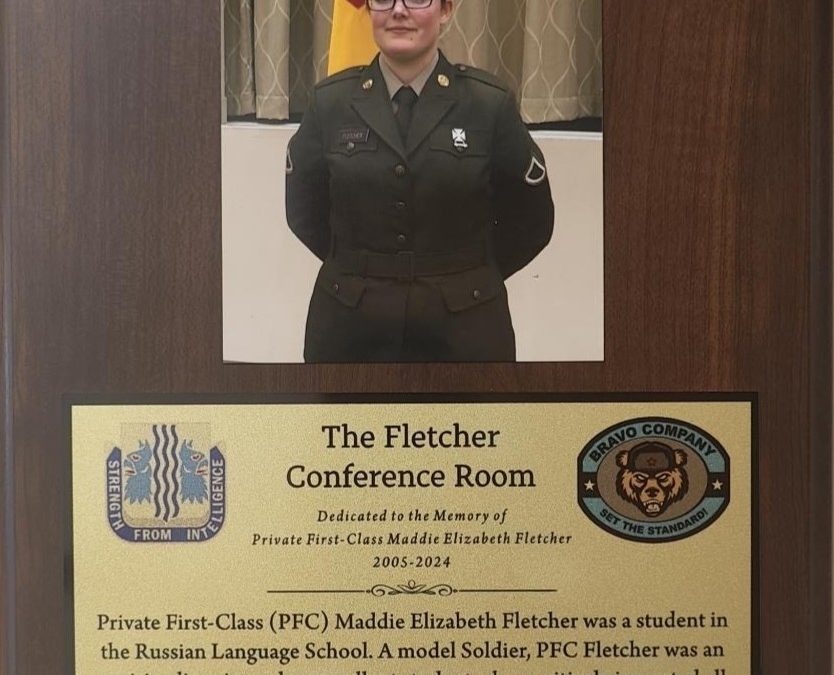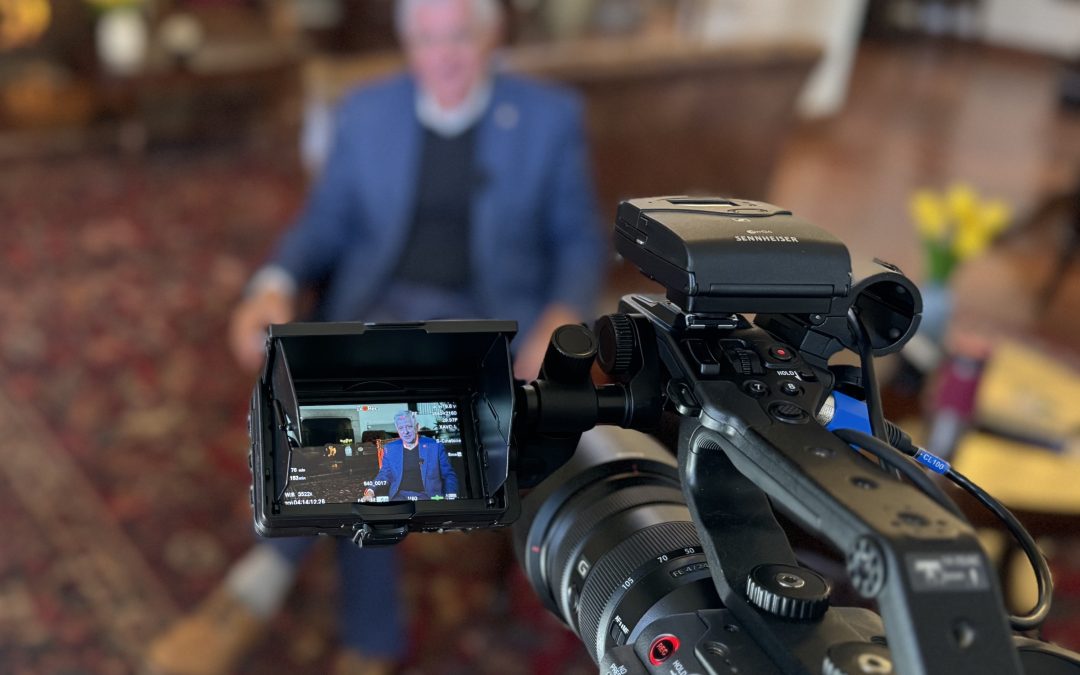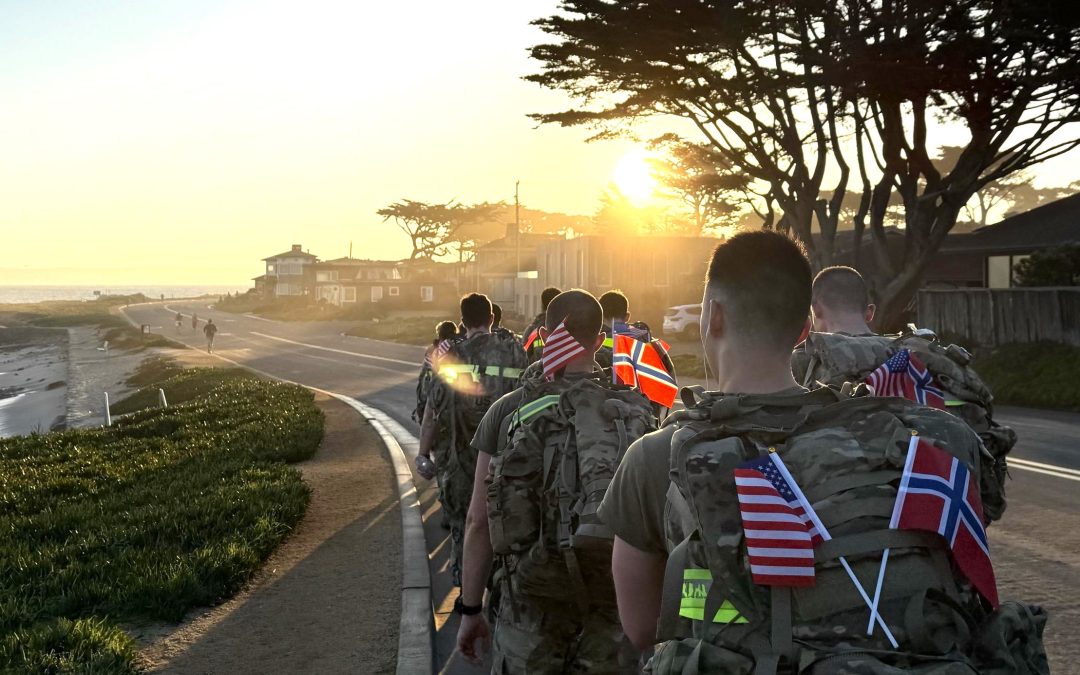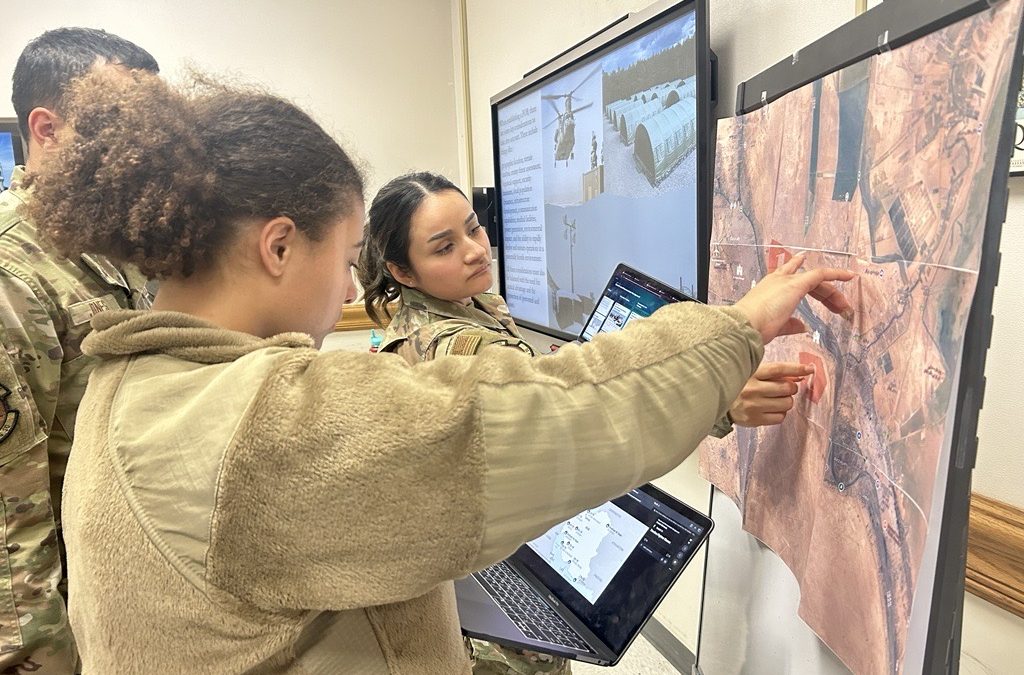It was in late August 2021 that the staff and faculty at the Defense Language Institute Foreign Language Center got the call – the Air Force and the Army were looking for volunteer Pashto and Dari linguists to help with Operation Allies Refuge/Welcome, the federal government-wide effort to support vulnerable Afghan refugees and assist in their resettlement.
The backdrop was complicated. DLIFLC not only trains military members, a number of whom lost their lives in the 20 years fighting the war on terror in Afghanistan, it also employs people from all over the world, to include Afghans who still have family and friends in country. To say that the U.S. pull out of Afghanistan was bittersweet would be to oversimplify it. As rescue operations grew to epic proportions on the ground in the capital Kabul, it became clear that linguists and native speakers would be needed to assist in all aspects of the resettlement process.
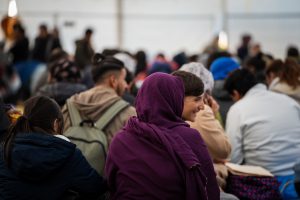
Evacuees wait to be processed at the Transportation Security Administration compliant, purpose-built passenger terminal at Ramstein Air Base, Germany, as they prepare to travel to the United States, Oct. 9, 2021. Ramstein is working with various entities to process evacuees through security check-points to ensure the safety of passengers, personnel and flights. (U.S. Air Force photo by Senior Airman Jacob Wongwai)
“I was excited for the opportunity,” said Sgt. 1st Class Bobby Keeth, chief military language instructor for the Persian Farsi schoolhouse, who volunteered to assist. “It was something I’d never done before.”
Keeth and his team of Soldiers arrived in early September to the Rhine Ordnance Barracks, Germany, just one of eight U.S. military installations across Europe taking in evacuees. The expectation, Keeth said, was to process the evacuees rapidly and send them off to their respective locations stateside for more in-depth processing. Because of an agreement with the German government to have the refugees in country no more than 10 days, they planned to have all the evacuees taken care of and on to their next destination by mid- September.
“There were five military linguists and maybe five or 10 contractors for a group of something like 8,000 individuals,” Keeth said.
Keeth used his Persian Farsi, a language very similar to Afghan Dari, to help with what he referred to as “exfil” or exfiltration, the quick processing of evacuees to get to their next station in one of eight different military instillation across the U.S. This meant confirming their identity, getting the families together for the bus manifest and then plane manifest. All done typically within 12 hours.
This made for particularly exhausting work days.
But within five days of Keeth’s arrival, a measles outbreak caused the Center for Disease Control to shut down flights for three weeks. And the entire operation took a massive turn.
“It went from being a straight exfil operation to sustainment operations,” he said.
The move from exfilling to finding accommodations, bedding, facilities and food for the thousands of evacuees was quick. Gigantic, hard-sided tents were used, complete with fans to cool and heat as needed. It also meant that Keeth and his team switched their focus to helping the Afghans to be as comfortable as possible under the circumstances, which brought its own logistical challenges. They began holding daily meetings, or shuras, with the elders, to talk about expectations, making sure certain standards were being met and addressing any concerns.
“We [were] looking to create trust with the Afghans,” said Sgt. 1st Class Michael Turner, a DLIFLC linguist who was also assigned to ROB as an interpreter. “We tr[ied] to be viewed in a positive light and we want[ed] to make sure they knew we are their friends.” To that end, the linguists wore civilian clothes rather than their uniforms when interacting with the evacuees.
There were frustrations among the elders during the shuras that it was taking too long to get things moving. Understandable, Keeth said, but unless someone had immunization records, they had to get an MMR (measles-mumps-rubella) vaccine and then quarantine for 21 days. Even if they had their shot records, they still had to wait for the CDC to lift the no-fly order.
In the interim, the linguists and contract translators were able to work with the evacuees on the skills they would need regarding American culture once they were stateside.
They began holding informal classes in things like applying for a green card and finding employment.
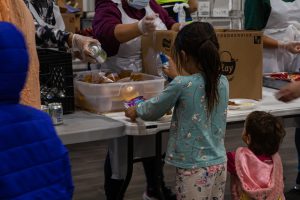
An Afghan child receives lunch in the new dining facility at Aman Omid Village on Holloman Air Force Base, New Mexico, Oct. 20, 2021. The Department of Defense, through U.S. Northern Command, and in support of the Department of Homeland Security, is providing transportation, temporary housing, medical screening, and general support for at least 50,000 Afghan evacuees at suitable facilities, in permanent or temporary structures, as quickly as possible. This initiative provides Afghan personnel essential support at secure locations outside Afghanistan. (U.S. Army photo by Pfc. Anthony Sanchez)
Turner also taught classes on survival English, basic words and phrases “that will allow for the population to thrive in the United States,” he said.
Meanwhile, several Air Force linguists who were DLIFLC staff with Pashto, Dari and Farsi language skills had been sent to Holloman Air Force Base, New Mexico, to help the Afghans, or guests as they were called, settle into the villages built specifically for the evacuees. They landed at the base in late August, expecting to take the next flight to Germany to help out there. Instead, they stayed in New Mexico.
“We were the first ones there along with the civil engineers,” said Staff Sgt. Heather Stock, a Persian Farsi linguist and an academic training advisor at DLIFLC. This meant that they watched the camp, called Aman Omid Village, being built from the ground up. “We also arrived before the evacuees,” she added.
In fact, the linguists arrived only 12 hours before the first flight was supposed to fly in. It was still in the early days before the complete withdrawal from Afghanistan and the forces were scrambling to have everything prepared for their guests.
“For these people, hospitality is huge in their culture,” explained Tech. Sgt. Phil Rowe, a Pashto-speaking chief MLI at DLIFLC. “We wanted them to be viewed as humans every day,” rather than as a refugee, which can have a negative connotation, he explained.
The guests would be staying longer at Holloman AFB while their paperwork was being processed by the State Department, so the focus for the linguists there was on sustainment – how could they help make things easier for these displaced people who were not only coming from an incredibly difficult situation but were now in an entirely different culture?
Stock found it to be a challenge to communicate at times.
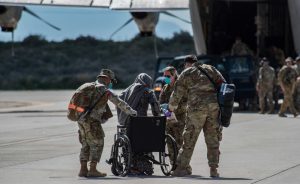
Airmen from Task Force-Holloman assist an Afghan evacuee into a wheelchair on the ramp at Holloman Air Force Base, New Mexico, Aug. 31, 2021. The Department of Defense, through U.S. Northern Command, and in support of the Department of State and Department of Homeland Security, is providing transportation, temporary housing, medical screening, and general support for up to 50,000 Afghan evacuees at suitable facilities, in permanent or temporary structures, as quickly as possible. This initiative provides Afghan evacuees essential support at secure locations outside Afghanistan. (U.S. Air Force photo by Staff Sgt. Kenneth Boyton)
“We were translators, but we turned into social workers,” she said. She explained that it can be complicated to communicate in your own language let alone in a foreign tongue when you don’t have the solutions. “Having to empathize with a mother who lost her child because the Taliban murdered them in target language is nearly impossible.”
“We were just the translators,” Stock said. She says she still hears that in her head since she’s been back. “‘I’m just a translator, I’m sorry, I don’t have these answers for you.’”
It was a potent mix of uncertainty, fear and reaction. One small way to alleviate some of that discomfort was to always speak to the evacuees in their language, whether they knew English or not.
“We still always initiated conversation in target language to let them know, that’s why we’re here – make sure that they can articulate their feelings and needs in their own language instead of having to adjust to English,” Stock said.
Despite the challenges, long days and frustrations, there was a universal consensus that it was a life-changing experience.
Being there from the start, helping to build everything from the ground up meant Rowe was reluctant to leave. “You begin to get this sense of ownership, and get protective over what you have built,” he said. He’s still part of the chats, paying attention to how things are going after he left.
Even with two deployments in the war on terror under his belt, Keeth felt it was the most fulfilling thing he had ever done in the Army. “This was far beyond anything that I’ve done [with] it being a humanitarian mission. Just the ability to go out and actually give these people a voice and help them was very fulfilling.”
As for Stock, she said this assignment was the most difficult thing she’d ever done. For her, though, one of the most rewarding parts of her time translating was seeing the women come off the planes and being educated enough to report sexual assault or domestic violence. She said, “They knew that this is not going to fly here in the United States, and that was all taken care of. Every single event or situation that was reported was all investigated and taken care of.”
“I’m so thankful for this opportunity and I would never change it,” Stock said. “It was eye-opening, and it changed me in real life for good.”
Article written with contributions from Shaylee R. Borcsani at USAG Rheinland-Pfalz

